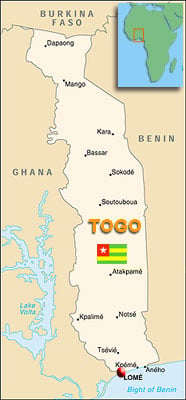LOMÉ
President Gnassingbe Eyadema of Togo, Africa’s longest serving head of state, died on Saturday. The armed forces of the small West African country immediately suspended the constitution and named one of his sons, Faure Essozima Gnassingbe as head of state.
Eyadema’s death, after 38 years in power, was announced on state radio by Prime Minister Kofi Sama on Saturday night.
Two hours later, General Zachari Nandja, the Chief of Staff of the Armed Forces, said in a statement on state television that the constitution had been suspended and Faure Gnassingbe, who was a junior minister in the government, had been appointed head of state.
“The Togolese armed forces swear allegiance to Faure Gnassingbe as President of the Republic of Togo,” said Nandja, who was flanked by the country’s other top military commanders.
The television showed pictures of Nandja shaking the hand of Faure Gnassingbe and one of his younger brothers, Kpatcha Gnassingbe, who is director of the duty free manufacturing zone in Lome and another influential figure in government.
According to the constitution, the President of the National Assembly, Fambare Ouattara Natchaba, should have become acting head of state following the death in office of the president.
However, Nandja said Natchaba was out of the country leading a parliamentary delegation to Europe, so the armed forces had suspended the constitution and appointed Eyadema’s son as the country’s new leader instead.
Sama said earlier that Eyadema, 69, had died on Saturday morning while he was undergoing medical evacuation for treatment abroad.
He did not give the cause of death, but there had been rumours in Lome for some time that Eyadema was seriously ill.
The former army colonel, who seized power in a 1967 coup, had ruled Togo with an iron hand for 38 years and was Africa’s longest serving head of state.
Faure Gnassingbe, who is in his early 30’s was appointed Minister of Public Works, Mines and Telecommunications in July 2003 following his father’s re-election for a further five-year term in June that year.
He had previously been a parliamentary deputy of his father’s ruling Rally of the Togolese People (RPT) party.
Faure Gnassingbe's appointment as a minister two years ago was widely interpreted as a sign that he was being groomed to be his father's successor as president.
The prime minister announced in his radio broadcast that all Togo’s airports, sea ports and land frontiers had been closed until further notice and said the armed forces were determined to maintain order.
He warned against the country descending into “chaos, division and anarchy.”
Frightened inhabitants of the capital Lome rushed home immediately after Eyadema’s death was announced, but the city remained calm and there were plenty of people on the streets in the city centre.
Despite the military takeover, there were no signs of an increased presence by the security forces in the streets.
Eyadema had several wives and was widely believed to have fathered more than 100 children, several of whom have become influential figures in national life.
This is not the first time that the young son of an African leader has taken over as head of state following his father’s unexpected death in office.
In January 2001, Joseph Kabila succeeded his father Laurent Kabila as president of the Democratic Republic of Congo at the age of 30 after his father was assassinated.
This article was produced by IRIN News while it was part of the United Nations Office for the Coordination of Humanitarian Affairs. Please send queries on copyright or liability to the UN. For more information: https://shop.un.org/rights-permissions





